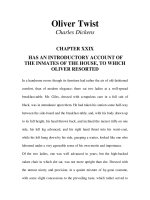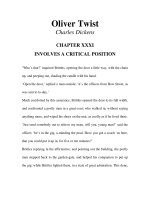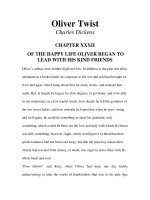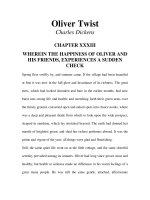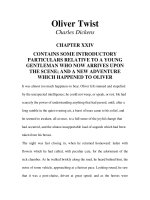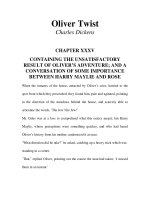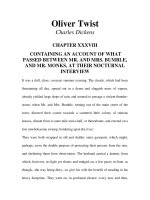Tài liệu LUYỆN ĐỌC TIẾNG ANH QUA TÁC PHẨM VĂN HỌC-SHORT STORY BY O’HENRY- Two Thanksgiving Day Gentlemen docx
Bạn đang xem bản rút gọn của tài liệu. Xem và tải ngay bản đầy đủ của tài liệu tại đây (25.56 KB, 8 trang )
SHORT STORY BY O’HENRY
Two Thanksgiving Day Gentlemen
There is one day that is ours. There is one day when all we
Americans who are not self-made go back to the old home to eat
saleratus biscuits and marvel how much nearer to the porch the old
pump looks than it used to. Bless the day. President Roosevelt gives
it to us. We hear some talk of the Puritans, but don't just remember
who they were. Bet we can lick 'em, anyhow, if they try to land
again. Plymouth Rocks? Well, that sounds more familiar. Lots of us
have had to come down to hens since the Turkey Trust got its work
in. But somebody in Washington is leaking out advance information
to 'em about these Thanksgiving proclamations.
The big city east of the cranberry bogs has made Thanksgiving Day an
institution. The last Thursday in November is the only day in the
year on which it recognizes the part of America lying across the
ferries. It is the one day that is purely American. Yes, a day of
celebration, exclusively American.
And now for the story which is to prove to you that we have
traditions on this side of the ocean that are becoming older at a
much rapider rate than those of England are--thanks to our git-up
and enterprise.
Stuffy Pete took his seat on the third bench to the right as you
enter Union Square from the east, at the walk opposite the fountain.
Every Thanksgiving Day for nine years he had taken his seat there
promptly at 1 o'clock. For every time he had done so things had
happened to him--Charles Dickensy things that swelled his waistcoat
above his heart, and equally on the other side.
But to-day Stuffy Pete's appearance at the annual trysting place
seemed to have been rather the result of habit than of the yearly
hunger which, as the philanthropists seem to think, afflicts the
poor at such extended intervals.
Certainly Pete was not hungry. He had just come from a feast
that had left him of his powers barely those of respiration and
locomotion. His eyes were like two pale gooseberries firmly imbedded
in a swollen and gravy-smeared mask of putty. His breath came
in short wheezes; a senatorial roll of adipose tissue denied a
fashionable set to his upturned coat collar. Buttons that had been
sewed upon his clothes by kind Salvation fingers a week before flew
like popcorn, strewing the earth around him. Ragged he was, with a
split shirt front open to the wishbone; but the November breeze,
carrying fine snowflakes, brought him only a grateful coolness.
For Stuffy Pete was overcharged with the caloric produced by a
super-bountiful dinner, beginning with oysters and ending with plum
pudding, and including (it seemed to him) all the roast turkey and
baked potatoes and chicken salad and squash pie and ice cream in
the world. Wherefore he sat, gorged, and gazed upon the world with
after-dinner contempt.
The meal had been an unexpected one. He was passing a red brick
mansion near the beginning of Fifth avenue, in which lived two old
ladies of ancient family and a reverence for traditions. They even
denied the existence of New York, and believed that Thanksgiving Day
was declared solely for Washington Square. One of their traditional
habits was to station a servant at the postern gate with orders to
admit the first hungry wayfarer that came along after the hour of
noon had struck, and banquet him to a finish. Stuffy Pete happened
to pass by on his way to the park, and the seneschals gathered him
in and upheld the custom of the castle.
After Stuffy Pete had gazed straight before him for ten minutes he
was conscious of a desire for a more varied field of vision. With a
tremendous effort he moved his head slowly to the left. And then his
eyes bulged out fearfully, and his breath ceased, and the rough-shod
ends of his short legs wriggled and rustled on the gravel.
For the Old Gentleman was coming across Fourth avenue toward his
bench.
Every Thanksgiving Day for nine years the Old Gentleman had come
there and found Stuffy Pete on his bench. That was a thing that the
Old Gentleman was trying to make a tradition of. Every Thanksgiving
Day for nine years he had found Stuffy there, and had led him to a
restaurant and watched him eat a big dinner. They do those things in
England unconsciously. But this is a young country, and nine years
is not so bad. The Old Gentleman was a staunch American patriot, and
considered himself a pioneer in American tradition. In order to
become picturesque we must keep on doing one thing for a long time
without ever letting it get away from us. Something like collecting
the weekly dimes in industrial insurance. Or cleaning the streets.
The Old Gentleman moved, straight and stately, toward the
Institution that he was rearing. Truly, the annual feeding of Stuffy
Pete was nothing national in its character, such as the Magna Charta
or jam for breakfast was in England. But it was a step. It was
almost feudal. It showed, at least, that a Custom was not impossible
to New Y--ahem!--America.
The Old Gentleman was thin and tall and sixty. He was dressed all in
black, and wore the old-fashioned kind of glasses that won't stay
on your nose. His hair was whiter and thinner than it had been last
year, and he seemed to make more use of his big, knobby cane with
the crooked handle.
As his established benefactor came up Stuffy wheezed and shuddered
like some woman's over-fat pug when a street dog bristles up at him.
He would have flown, but all the skill of Santos-Dumont could not
have separated him from his bench. Well had the myrmidons of the two
old ladies done their work.
"Good morning," said the Old Gentleman. "I am glad to perceive that
the vicissitudes of another year have spared you to move in health
about the beautiful world. For that blessing alone this day of
thanksgiving is well proclaimed to each of us. If you will come with
me, my man, I will provide you with a dinner that should make your
physical being accord with the mental."
That is what the old Gentleman said every time. Every Thanksgiving
Day for nine years. The words themselves almost formed an
Institution. Nothing could be compared with them except the
Declaration of Independence. Always before they had been music in
Stuffy's ears. But now he looked up at the Old Gentleman's face with
tearful agony in his own. The fine snow almost sizzled when it fell
upon his perspiring brow. But the Old Gentleman shivered a little
and turned his back to the wind.
Stuffy had always wondered why the Old Gentleman spoke his speech
rather sadly. He did not know that it was because he was wishing
every time that he had a son to succeed him. A son who would come
there after he was gone--a son who would stand proud and strong
before some subsequent Stuffy, and say: "In memory of my father."
Then it would be an Institution.
But the Old Gentleman had no relatives. He lived in rented rooms
in one of the decayed old family brownstone mansions in one of the
quiet streets east of the park. In the winter he raised fuchsias in
a little conservatory the size of a steamer trunk. In the spring he
walked in the Easter parade. In the summer he lived at a farmhouse
in the New Jersey hills, and sat in a wicker armchair, speaking of
a butterfly, the ornithoptera amphrisius, that he hoped to find
some day. In the autumn he fed Stuffy a dinner. These were the Old
Gentleman's occupations.
Stuffy Pete looked up at him for a half minute, stewing and helpless
in his own self-pity. The Old Gentleman's eyes were bright with the

